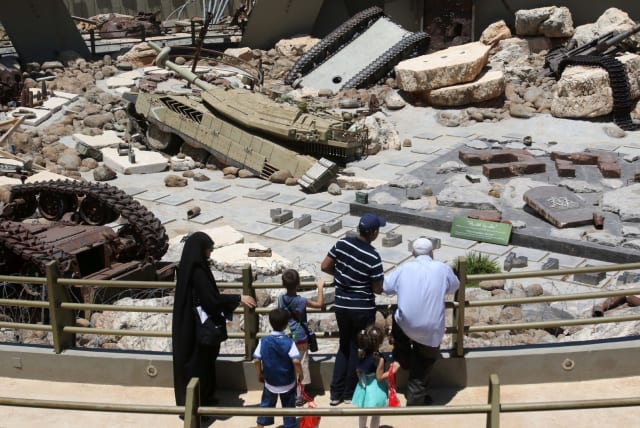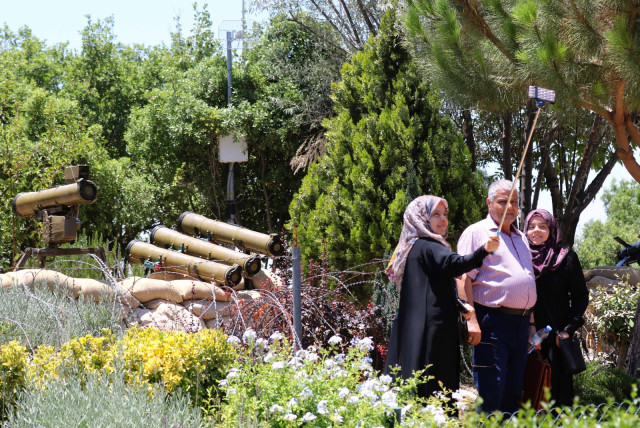Clergy slammed for visit to Hezbollah ‘museum’ in Lebanon - analysis

The decision for some clergy to go to the Hezbollah site appears to be in contrast to the official position of the Maronite patriarch, whose seat is in Bkerke in Lebanon.
A controversy in Lebanon broke out over the weekend after some Christian clergy were seen visiting a site that is known as a Lebanese Hezbollah tourist attraction called the “Tourist Landmark of the Resistance,” which is located near the village of Mleeta in Lebanon. The attraction was opened in 2010 and is used by Hezbollah to spread propaganda about its “resistance” against Israel.
Photos and videos posted online appeared to show clergy walking to the “museum” surrounded by men with Hezbollah flags. Critics posted online that the visit was “shameful” and that it was perplexing why church officials would visit the site. Another critic said the clergy should have removed their crosses if they wanted to go to Mleeta. According to one account, the clerics came from various areas in Lebanon, including the Bekaa Valley, Zahle, Jezzine, and Sidon, and were accompanied by Hezbollah religious figure Sheikh Mohammed Yazbak.
The visit comes in the wake of Hezbollah celebrating Israel’s withdrawal from Lebanon, which took place on May 24, 2000. Last week was the anniversary.
Nadim Gemayel condemned the visit of the clergy to the Mleeta museum according to Lebanon’s MTV. He tweeted in Arabic that “The visit of some bishops to the Iranian Militia Museum is the antithesis of the Church's concepts and evidence of the slander of those who have nothing to do with the Church's historical struggle.”
He went on to note “The church taught us to bear witness to the truth and to speak nothing but the truth. The Church taught us not to live as dhimmis and not to compromise, especially with regard to our security, our freedom, the sovereignty of our country, our existence and our dignity.”
Gemayel is the son of Bashir Gemayel, the Lebanese president who was assassinated in 1982. He is the grandson of Pierre Gemayel and a member of parliament for the Kataeb party.
Why did Christian clergy visit a Hezbollah tourist site?
The decision for some clergy to go to the site appears to be in contrast to the official position of the Maronite patriarch, whose seat is in Bkerke in Lebanon.
Lebanon is in the midst of a crisis over the election of a new president. By rule, the president of Lebanon must be a Christian. However, the divided politics of Lebanon means that Hezbollah supports certain Christian candidates and others who are opposed to Hezbollah support various candidates.
In April, Suleiman Franjieh, who was seen as Hezbollah’s potential choice for the presidency, visited Maronite Patriarch Bechara Boutros al-Rahi at his office in Bkerke. The patriarch met a delegation of Hezbollah in January. The patriarch is traveling to meet France’s President Emmanuel Macron, according to a report on Sunday.
According to LBC in Lebanon, the head of the Executive Council of Hezbollah, Hashem Safieddine, said on Sunday that there must be a consensus on the new president of Lebanon. The Maronite patriarch has also called for the election of a president as soon as possible to end the chaos in the country.
Jerusalem Post Store
`; document.getElementById("linkPremium").innerHTML = cont; var divWithLink = document.getElementById("premium-link"); if (divWithLink !== null && divWithLink !== 'undefined') { divWithLink.style.border = "solid 1px #cb0f3e"; divWithLink.style.textAlign = "center"; divWithLink.style.marginBottom = "15px"; divWithLink.style.marginTop = "15px"; divWithLink.style.width = "100%"; divWithLink.style.backgroundColor = "#122952"; divWithLink.style.color = "#ffffff"; divWithLink.style.lineHeight = "1.5"; } } (function (v, i) { });

